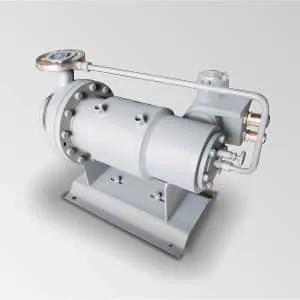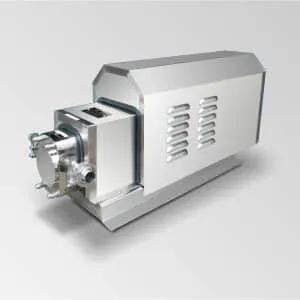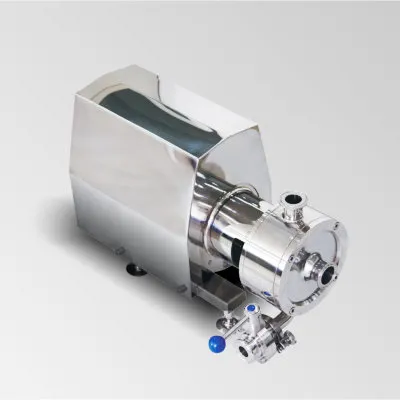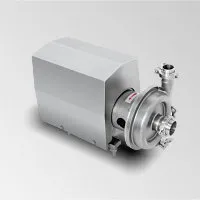Hygienic Centrifugal Pump
How Hygienic Centrifugal Pump Works
- Impeller: The pump contains an impeller, typically made from stainless steel with a polished surface finish that meets sanitary standards. When the impeller rotates, it creates a centrifugal force that pushes fluid outwards from its center.
- Inlet: Fluid enters the pump through a hygienically designed inlet, which is often a flush or recessed design to minimize dead zones where contaminants could accumulate.
- Volute: As the fluid leaves the impeller, it enters the volute (a spiral-shaped housing), where the velocity energy is converted into pressure energy. The smooth, crevice-free interior minimizes bacterial growth and allows for easy cleaning.
- Seals: The pump uses specialized seals like mechanical seals or diaphragm seals that meet food-grade or pharmaceutical-grade requirements to prevent any leakage or contamination between the rotating shaft and stationary pump casing.
- CIP Compatibility: A key feature of a Hygienic Centrifugal Pump is its Clean-in-Place (CIP) capability. This means the pump can be thoroughly cleaned without disassembly, using high-pressure water or chemical solutions that flow through the system to remove all traces of product residue.
- Disassembly: When necessary, components are designed for quick and easy disassembly for more thorough inspection, maintenance, or replacement. Quick-release clamps or bolted connections ensure no contamination during assembly and disassembly processes.
-
Connections: All pipe connections use hygienic fittings such as Tri-clamp, DIN or SMS, which provide a secure seal and allow for rapid connection and disconnection without compromising cleanliness.
In summary, a Hygienic Centrifugal Pump works just like a standard centrifugal pump in terms of fluid dynamics, but with additional features specifically engineered to maintain the highest level of hygiene throughout the pumping process, making them ideal for industries where purity and sanitation are critical.
Specification
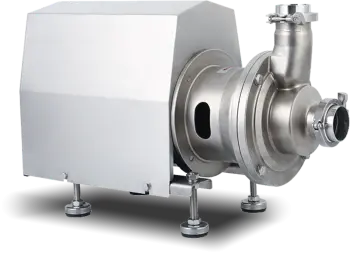
Structure
SeFluid’s Hygienic Centrifugal Pumps are designed with a focus on hygiene, cleanability, and minimal product contamination. The following components outline the typical structure of our pumps:
- Casing: The pump casing forms the outer shell and often has a smooth, polished surface to prevent bacterial adhesion and facilitate cleaning. It houses the impeller and other internal parts.
- Impeller: This is the rotating part that generates centrifugal force to move fluid through the pump. Impellers in hygienic pumps are typically made from stainless steel and have a sanitary design without crevices or sharp corners for easy cleaning and reduced risk of product entrapment.
- Shaft: A stainless steel shaft connects the impeller to the motor and passes through the pump housing. To prevent leakage and contamination, it uses specialized hygienic seals like single-use diaphragm seals or mechanical seals with FDA-compliant elastomers.
- Sealing System: The sealing arrangement is critical in maintaining hygiene standards. It may include double mechanical seals with a sealed barrier fluid chamber or cartridge seals designed for Clean-in-Place (CIP) and Sterilize-in-Place (SIP) procedures.
- Inlet & Outlet Ports: These ports are designed for quick disassembly and connection using sanitary fittings such as Tri-Clamp, DIN, or SMS connections. They ensure a crevice-free flow path and minimize dead-legs where product can stagnate.
- Bearings: Bearings support the shaft and allow it to rotate smoothly. They are often sealed and lubricated to prevent contamination and are selected to meet food-grade requirements.
- Driveshaft Connection: The driveshaft connects the electric motor to the pump’s shaft. In hygienic designs, this connection is often simplified to reduce areas where bacteria can accumulate and to facilitate maintenance.
- Frame or Mounting Feet: The pump frame or mounting feet provide stability and alignment during operation, ensuring the pump operates at optimal efficiency while also allowing for easy installation and removal for maintenance purposes.
- Flanges and Gaskets: All flanges and gaskets used in hygienic pumps are designed for quick assembly/disassembly and use materials compatible with CIP/SIP processes, ensuring no compromise to sanitation.
Overall, every component of a Hygienic Centrifugal Pump is engineered to maintain high levels of cleanliness, enable efficient cleaning and sterilization procedures, and minimize any risk of product contamination throughout the entire pumping process.
Material
A Hygienic Centrifugal Pump is typically constructed using high-quality materials that meet stringent sanitary standards to ensure they are corrosion-resistant, durable, and easy to clean. The most common material used in the construction of these pumps is stainless steel, usually grade 304 or 316L, due to its excellent resistance to chemical corrosion and its non-reactive properties with food products, pharmaceuticals, and other hygienically sensitive fluids.
Stainless Steel Body: The pump body, impeller, casing, and shaft are often made from stainless steel to withstand harsh cleaning chemicals, high temperatures during CIP (Clean-in-Place) procedures, and to prevent any contamination from metal particles.
Seals: The seals used in a Hygienic Centrifugal Pump are critical components and may consist of FDA-compliant elastomers like EPDM, Viton, or PTFE, which offer chemical compatibility and low risk of product contamination. For more demanding applications, single-use diaphragm seals or magnetic couplings might be employed to eliminate direct contact between the product and mechanical seal faces.
Gaskets and Fasteners: Gaskets and fasteners, such as Tri-Clamp connections or other hygienic fittings, are also made from FDA-approved materials that can withstand repeated sterilization cycles without degrading.
Bearings: Bearings may be chosen for their durability under frequent washdown conditions and their ability to maintain lubrication integrity without contaminating the pumped fluid.
In summary, the choice of materials for a Hygienic Centrifugal Pump is essential to ensure it meets the highest hygienic standards required by industries like food processing, pharmaceuticals, and biotechnology, where purity and cleanliness are paramount.
Advantages
SeFluid’s Hygienic centrifugal pumps offer several advantages in various industries, particularly those that require strict sanitary standards. Here are some of the key advantages of hygienic centrifugal pumps:
- Hygienic Design: Hygienic Centrifugal Pumps are designed with smooth, crevice-free surfaces and rounded corners to minimize the risk of product residue accumulation or bacterial growth. They meet stringent hygienic standards set by regulatory bodies like 3-A Sanitary Standards and EHEDG (European Hygienic Engineering and Design Group).
- Clean-in-Place (CIP) Capability: These pumps can be easily cleaned and sanitized without disassembly due to their CIP compatibility, which saves time and reduces contamination risks during cleaning processes.
- Material Selection: Constructed primarily from high-grade stainless steel such as AISI 304 or 316L, they are corrosion-resistant and non-toxic, ensuring no contamination of the products being pumped.
- Leak-Free Sealing: Advanced sealing systems, including sanitary mechanical seals or single-use diaphragm seals, prevent leakage and cross-contamination between the product and the pump’s lubricants or environment.
- Quick Disassembly: Components are often designed for quick and easy assembly/disassembly, allowing for thorough inspection, maintenance, and replacement without compromising hygiene.
- Versatility: Hygienic centrifugal pumps can handle a wide range of viscosities and flow rates, making them suitable for various applications in food processing, pharmaceuticals, cosmetics, and other industries where hygiene is critical.
- Efficiency: Centrifugal pumps generally offer high efficiency and reliability, translating into lower energy consumption and reduced operating costs.
- Sanitary Connections: The use of Tri-Clamp, DIN, SMS, or other sanitary connections simplifies installation, maintenance, and ensures leak-proof performance.
- Low Shear Stress: Some hygienic centrifugal pumps are engineered to impart low shear forces on the product, preserving its integrity, especially beneficial when handling delicate fluids.
In summary, Hygienic Centrifugal Pumps provide exceptional hygiene, ease of cleaning, durability, and operational versatility while maintaining high levels of safety and product quality in sensitive industries.
Applications
Hygienic Centrifugal Pumps are widely used in industries where maintaining the highest levels of sanitation and cleanliness is critical to product quality and safety. Some key applications include:
Food & Beverage Industry: They are extensively employed in milk processing, fruit juice production, brewing, wine-making, confectionery, and other food manufacturing processes for transferring, filtering, or dosing various liquids without contamination.
Dairy Processing: In dairy plants, they handle milk, cream, cheese whey, yogurt, and other dairy products, ensuring that the pumps do not affect the taste, color, or nutritional value of the products.
Pharmaceuticals: These pumps are crucial in pharmaceutical production for transferring active ingredients, buffers, solvents, and sterile water, adhering to stringent hygienic standards to prevent any cross-contamination.
Biotechnology: Hygienic centrifugal pumps play a significant role in biotech facilities for moving cell cultures, media, and buffer solutions during the fermentation process.
Cosmetics Manufacturing: The pumps are utilized in cosmetic production for transferring and mixing liquid ingredients like lotions, creams, shampoos, and fragrances while maintaining product integrity.
Chemical Industry: In certain chemical processes requiring high purity or clean operations, such as fine chemicals or specialty chemicals, these pumps are used to transport fluids without affecting their composition.
CIP/SIP Systems: Hygienic centrifugal pumps are also integral parts of Clean-in-Place (CIP) and Sterilize-in-Place (SIP) systems within these industries, where they pump cleaning agents or sterilizing fluids through pipelines and equipment.
In essence, wherever there’s a need to maintain hygiene and sanitary conditions during fluid transfer, Hygienic Centrifugal Pumps prove to be indispensable tools. Their design ensures easy cleaning, minimal deadleg areas, and compatibility with sanitization procedures, making them ideal for environments governed by strict health and safety regulations.








